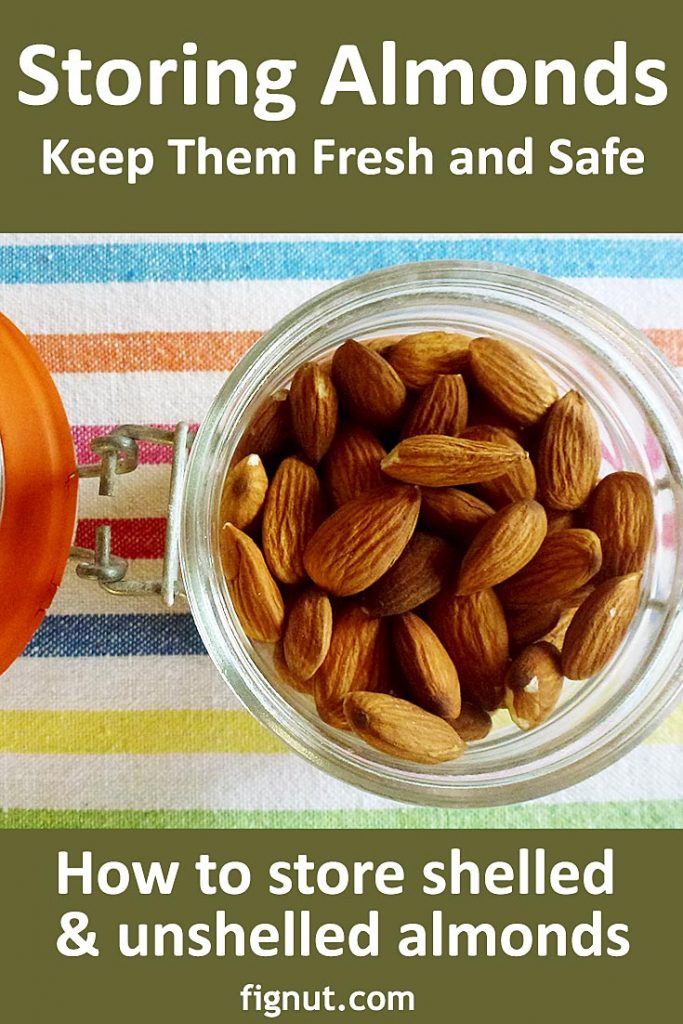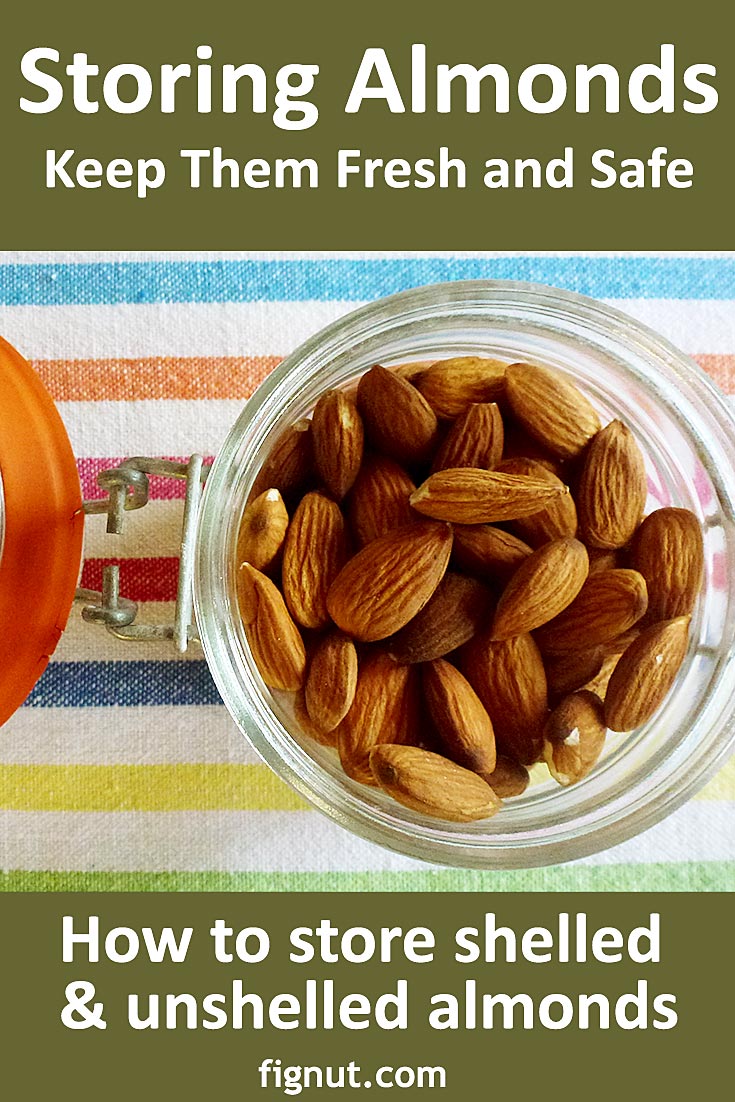Once your almond nuts are harvested, hulled, and properly dried, it is time now to find the best storage option to keep almonds fresh and safe to consume. You can choose to store either shelled or unshelled almonds. That means that you will now need to decide should you remove the shells or should you keep your almonds in shells.
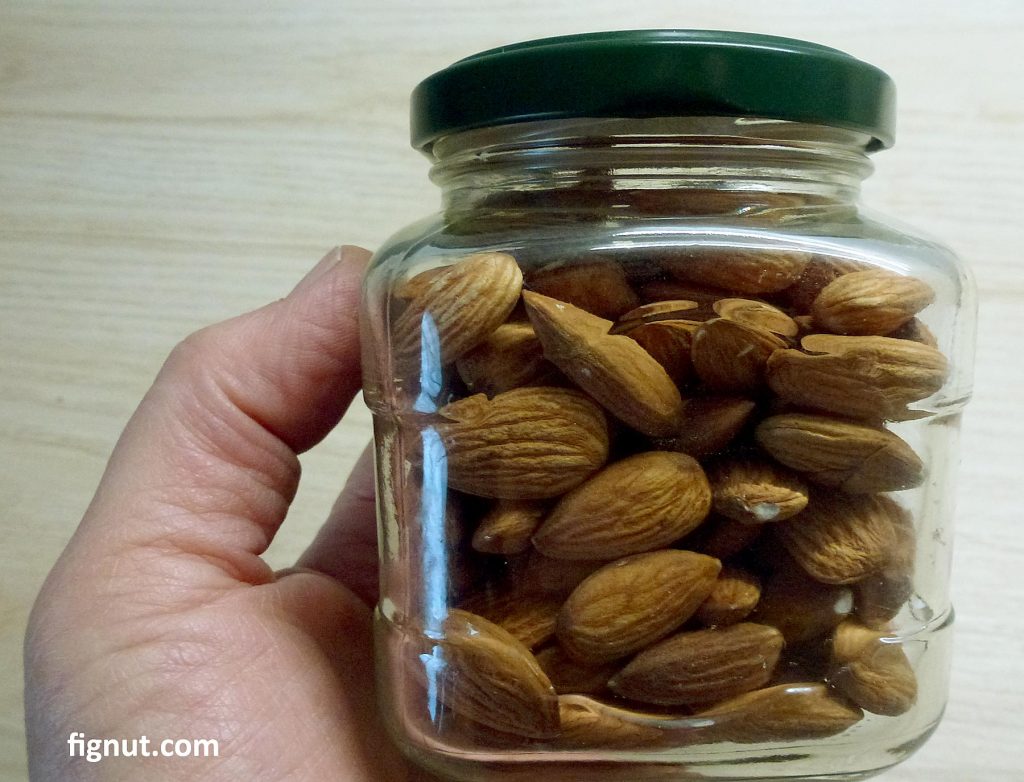
Table of Contents
Should you store shelled or unshelled almonds?
The answer to this depends on how many nuts you have and what you plan to do with them in the future. If you intend to use your almonds pretty soon, let’s say in 1 to 3 months, and you want to get rid of all the shells immediately, then crack them and store them unshelled.
If your intention is to keep them for a longer time, then keep the shells on your nuts. If you intend to keep the nuts in the fridge or freezer, then it is not such an important decision – you can refrigerate or freeze nuts in both forms, shelled or unshelled. The only difference is the amount of space they are taking.
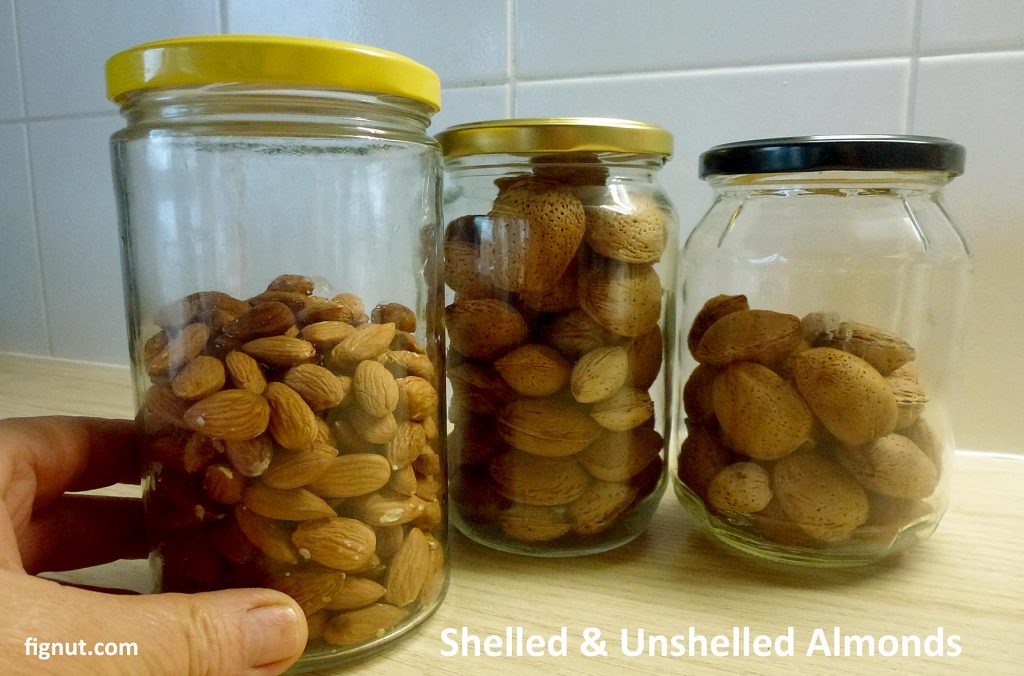
How to store shelled almonds
At the room temperature
If you intend to keep your shelled nuts at room temperature, the best and safest option is to store them in airtight mason jars as in the below photo. Display them on your kitchen table or shelf as they look very decorative. Stored this way, they can last at least 6 months at room temperature away from any moisture and higher temperatures.
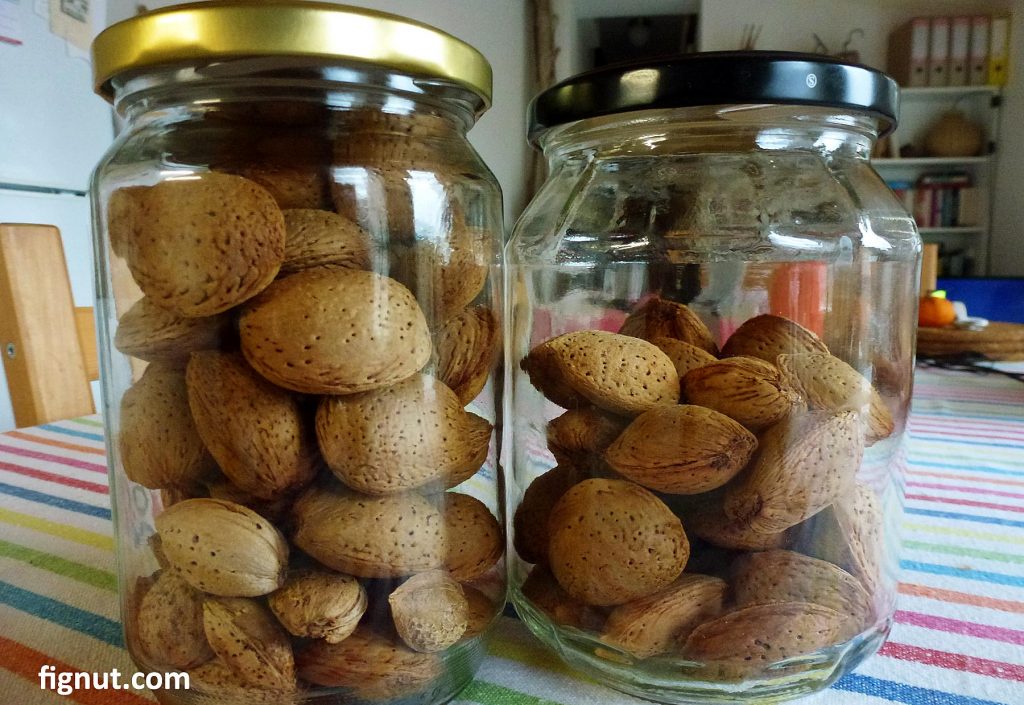
In the fridge/refrigerator or freezer
If you prefer to store your shelled nuts chilled in the refrigerator or freezer, put them into the airtight plastic containers (as in the below photo) which are fridge/freezing safe, where they can stay for months and even up to 2 years. You can also use freezer bags or vacuum freezer containers. All these options are safe for nuts, they will keep fresh and safe to consume for a long time.
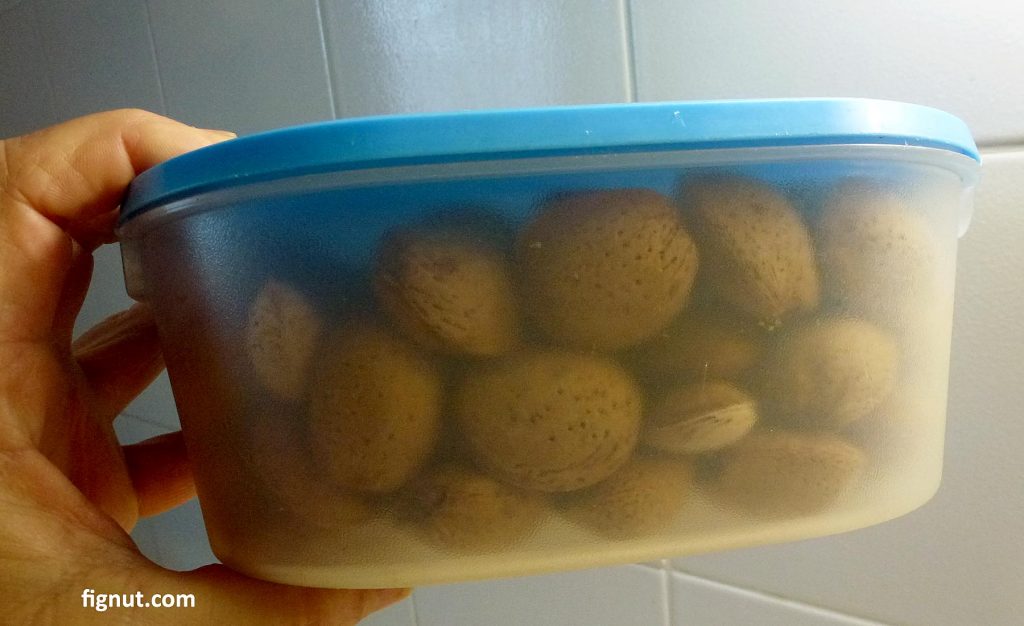
How to store unshelled almonds
If you decided to unshell your almonds (it may be due to shortage of space) or if you just bought some unshelled almonds and would like to store them safely for a longer periods, here are the options:
At the room temperature
Store your nuts in an airtight container preferably a see-through mason jar. They look decorative at the kitchen counter, table, or shelf, and at the same time are protected from moisture and from absorbing the odors of other foods that are nearby (such as onions or garlic). Bugs, ants, and insects also like to eat them, so a strong glass mason jar is an ideal place to keep them protected.
If you keep them airtight in a dry and cool place (away from kitchen hob and oven or radiator heat), they can last for a long time. I have some that are in the jar for more than a year and are still fine and tasty to eat.
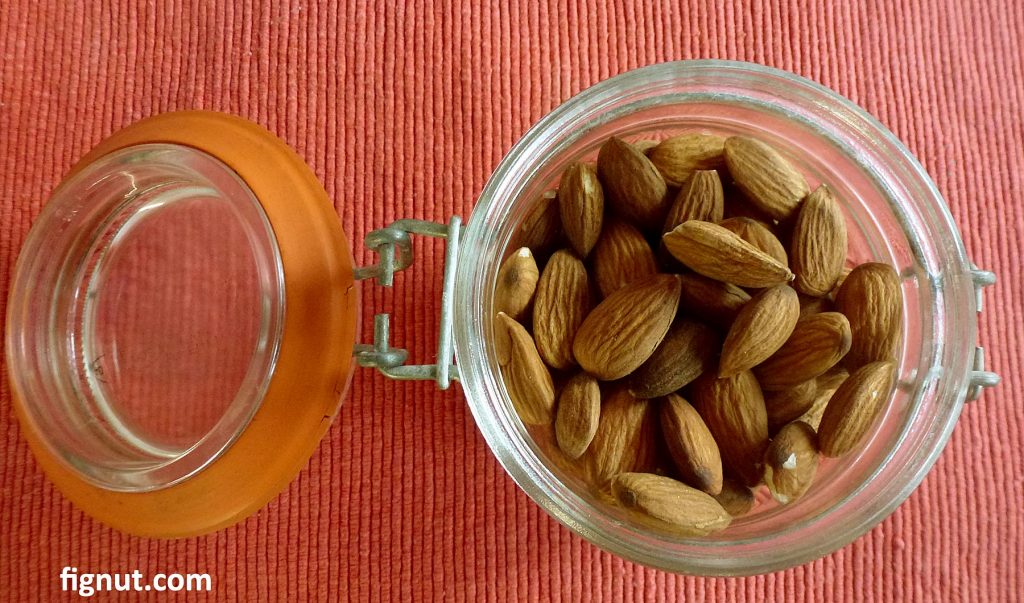
In the fridge/refrigerator
Refrigerate your nuts in an airtight plastic container. Bear in mind to keep the lid tightly closed all the time while in the refrigerator to prevent moisture or over-drying from the low temperature. If your container is not properly closed, the nuts will go either moldy (from too much moisture from the fridge) or will get wrinkly from low-temperature dehydration.
You can keep them refrigerated for a long time, for more than a year, they may shrink a bit over time but will still be edible, fairly fresh, and definitely safe to consume.
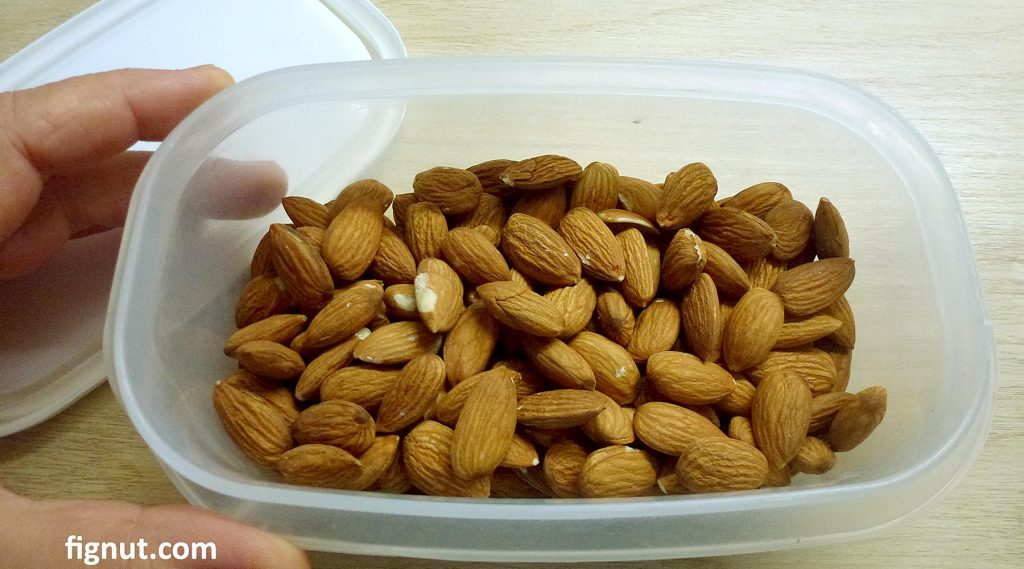
Freezing
Freeze your nuts either in freezer bags, preferably vacuumed, or in an airtight plastic container. The lid should be properly closed to prevent dehydration. If the lid is not properly closed, the nuts will dehydrate – they will shrink and get very wrinkly. You can keep them frozen for an indefinite time as long as the container of the bag is properly sealed. It is very unlikely they will get moldy in the freezer even if the bag is not tightly closed, they may shrink but will still be safe to consume.
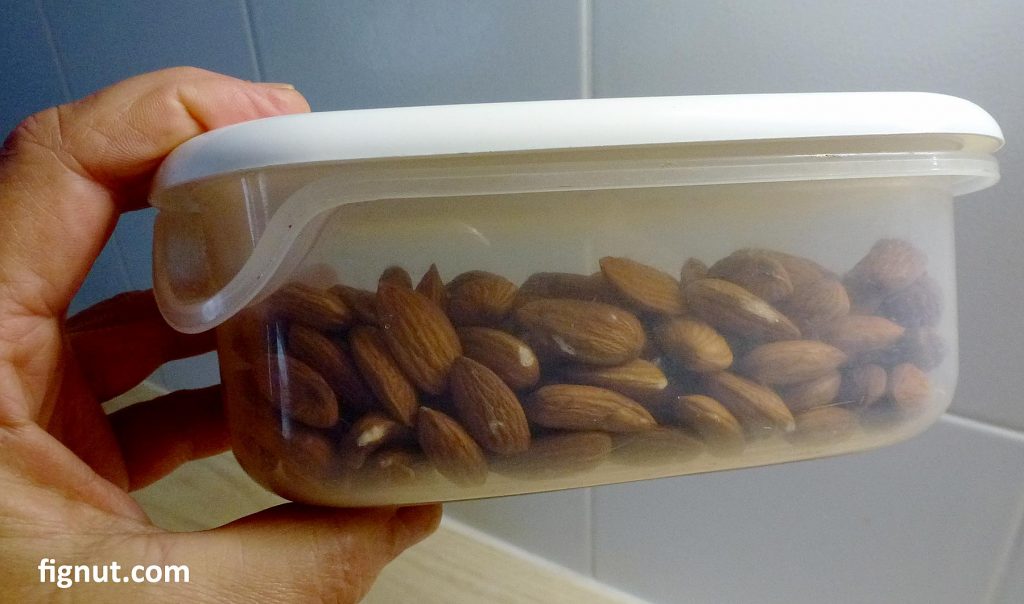
What is my recommendation
I prefer to store all of my food in a natural way if possible. That is the same with almonds. I don’t have a large refrigerator or freezer so I freeze or refrigerate only food that can not survive at room temperature. That’s why in principle, I store all my almonds shelled. I remove the shells on the day when I want to use them.
I keep unshelled almonds in the wooden fruit & vegetable crate on the shelf of my food pantry in the outdoor storage shed that is situated in the shaded corner of my garden (where also my dried figs are stored). That’s where I keep most of my stored food. The shed is not heated so from autumn (fall) when almonds are harvested, to spring, the temperatures there are not exceeding 12 °C.
In the summer it is a bit warmer, but almonds last there for a few years without any problems as long as they are in dry, drafty, cool, and shaded places. You can also use a fruit carton or plastic box but make sure it has some ventilation as shelled almonds need to be kept in a dark and drafty environment, away from heat and moisture.
How long shelled almonds can last?
At room temperature, the shelled almonds can last much longer than unshelled ones. You can keep them safely for up to about two years. Without the shell, they will last just a few months at room temperature. In the freezer, they last indefinitely while in the fridge they will be fresh and safe to eat for up to two years.
How to unshell the almonds
The easiest way to unshell any nuts at home is to use a nutcracker. There are numerous versions of nutcrackers you can get in your local store or order online. The prices vary, some are pretty cheap while others, more elaborate ones get expensive.
To be honest, I actually don’t have a nutcracker. I simply use my small hammer to gently knock on each nut to crack the shell. This is how I do it:
- Step 1 – place a kitchen towel on a hard surface – I usually use a large rock in my garden (don’t use a kitchen counter).
- Step 2 – put about 10 shelled almonds on the kitchen towel and cover them with another kitchen towel. This way you keep nuts firm on the spots ready to knock.
- Step 3 – gently knock several times on each nut.
- Step 4 – remove the top kitchen towel and pick each nut and remove the broken shell
If you worry that you may hit your fingers with a hammer, the alternative is to make a small DIY nut holder that you can use to keep your fingers away from possible hits by a hammer. You can do it easily and for free with a plastic bottle cap and a piece of wire.
Summary
When storing almonds it is important to:
- Keep them away from insects, ants, or other bugs. I use wild fennel as an insect repellent.
- Store them away from any food or herbs that have a strong odor/ smell
- Place them in airtight containers of any kind, as long as they are airtight they will do a job.
- Keep your nuts shelled if you have enough space. They will last longer.
- Compost the removed hulls if you can.
